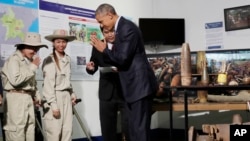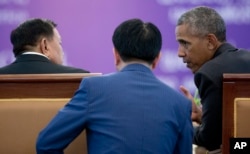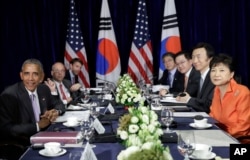President Barack Obama said Wednesday the United States has a "profound moral and humanitarian obligation" to support efforts to clear bombs its forces dropped on Laos during the Vietnam War.
Eighty million cluster munitions did not explode, instead settling on farmland and around villages, only to later kill or injure 20,000 people.
Obama spoke of that legacy as he visited a center in Vientiane called the Cooperative Orthotic and Prosthetic Enterprise that offers treatment for survivors.
"Here in Laos, here at COPE, we see the victims of bombs that were dropped because of decisions made half a century ago and we are reminded that wars always carry tremendous costs, many of them unintended," he said.
Obama stressed that wars impact countless people beyond the famous who appear in history books.
"Above all, acknowledging the history of war and how it's experienced concretely by ordinary people is a way that we make future wars less likely."
His comments came a day after announcing a doubling of U.S. funding over the next three years to help the survivors and bomb-clearing efforts.
Obama was also due to hold a town hall meeting later Wednesday with young people involved in a U.S.-sponsored leadership program.
Tuesday he reassured nations in the Asia Pacific region that the U.S. strategic rebalance “will endure for the long-term” because it “reflects fundamental national interests.”
In a speech in Vientiane, Laos, Obama said there is widespread recognition in the U.S. that the Asia Pacific region “will become even more important in the century ahead, both to America and to the world.”
The president addressed an estimated 1,000 people in Lao National Cultural Hall, one day after making history as the first sitting U.S. president to visit the country.
Against a backdrop of flags representing the U.S., Laos and the Association of Southeast Asian Nations (ASEAN), Obama spoke to a group that included government officials, Lao and U.S. business leaders, students, civil society leaders and women’s groups.
Obama’s has said engaging in the Asia-Pacific is critical to America’s future prosperity and security. The White House strategy has also aimed to serve as a counterweight to China’s rising influence and power in the region.
With fewer than five months left in office, Obama said the U.S. is more deeply engaged in the Asia-Pacific than it has been in decades.
“Our position is stronger and sends a clear message that as a Pacific nation we’re here to stay,” he said. “In good times and bad, you can count on the United States of America.”
TPP
However, the president also acknowledged the Trans-Pacific Partnership (TPP)—the economic “pillar” of his re-balance strategy—is in trouble at home.
The massive trade deal, signed by 12 Pacific rim nations, must be ratified by the U.S. Congress.
In this presidential election year, many Americans blame such trade pacts for lost jobs and both major party candidates, Democrat Hillary Clinton and Republican Donald Trump, have spoken out against it.
“As difficult as the politics are back home, I will continue to push hard on the U.S. Congress to approve TPP before I leave office,” vowed Obama. “Failure to move ahead with TPP will not just have economic consequences, but will call into question America’s leadership in this vital region.”
Assistance for Laos
Earlier Tuesday, Obama held talks with Laotian President Bounnhang Vorachit in the presidential palace.
Following the meeting, the White House announced a three-year, $90 million contribution to Laos for a national survey of unexploded ordnance and efforts to clear the bombs dropped by U.S. forces in the 1960s and 1970s.
About one-third of the 2.2 million bombs dropped on Laos remain undetonated and the lingering threat has slowed development in the country.
"Given our history here, I believe the United States has a moral obligation to help Laos heal," said Obama.
The White House said the two countries launched a new era in relations based on "a shared desire to heal the wounds of the past" and build a foundation for the future.
It included partnership on issues including the economy, technology, education, security, the environment and human rights.
Laos, which currently chairs the Association of Southeast Asian Nations (ASEAN), has been criticized for its human rights record. Obama and Vorachit noted in their meeting Tuesday "the benefits of a candid and open dialogue" to narrow differences on rights.
The White House said the new ties continue the president’s policy of reaching out to countries with whom the U.S. has had major differences and complicated histories.
It also reflects Obama’s efforts to more deeply engage nations in a region close to China, although the Obama administration has repeatedly said it welcomes a rising China that is peaceful, prosperous and responsible in global affairs.
Thitinan Pongsudhirak, political scientist at Thailand’s Chualongkorn University, said while the U.S. seeks to boost its influence, Laos is “firmly in China’s orbit”.
“The U.S. and China rivalry, competition for influence and interests in Southeast Asia, comprising maritime and mainland. The mainland is China’s backyard so it’s really China’s orbit within the mainland. But the mainland countries—Cambodia, Laos, Vietnam, Thailand—they are firmly in China’s orbit because China is the giant next door, especially for Laos,” he said.
Thitinan said Laos was still seeking to maintain a degree of autonomy despite China’s influence, even though it is “susceptible to neighborhood influence and interference”.
North Korea missile tests
Also Tuesday, Obama met with South Korean President Park Geun-hye.
The leaders discussed North Korea’s missile tests on Monday. Pyongyang fired three ballistic missiles from the western part of North Korea into the Sea of Japan.
Park called the tests “fundamentally threatening” and said the leaders agreed to "respond resolutely" to any provocation and close “loop holes” in sanctions.
Obama called the launches “provocative.” He also said the THAAD, the U.S. anti-missile system soon to be deployed to South Korea, is purely a defensive system.
Later this week, Southeast Asian nations will meet in Vientiane for the ASEAN and East Asia summits to discuss a range of issues, including the North Korea nuclear threat, China’s aggressive actions in the South China Sea, counter-terrorism, trade and other issues.
The visit marks President Obama’s eleventh and final trip to Asia as U.S. president.
Ron Corben contributed to this report from Bangkok.






